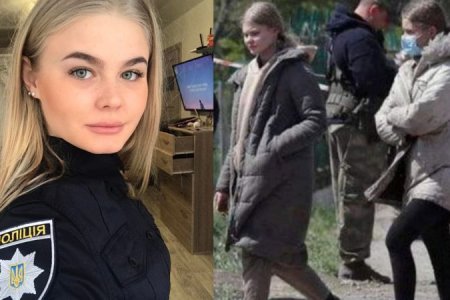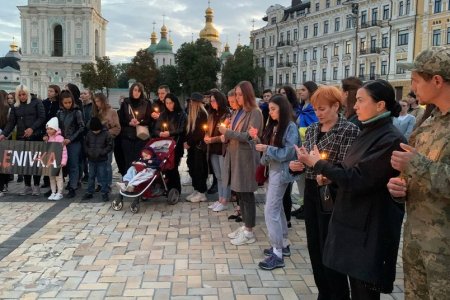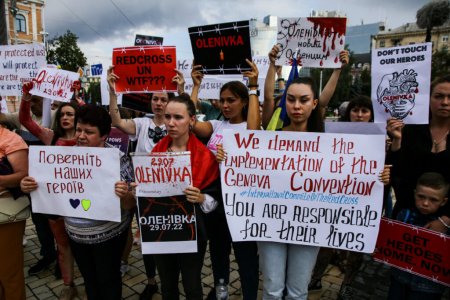
75 Ukrainian defenders and civilians returned to Ukraine on 31 May in the first exchange of prisoners since February this year. Many had spent two years or more in Russian captivity and have returned, gaunt and in ill-health after the torture and ill-treatment they endured. Among them was 24-year-old Marianna Checheliuk, from Mariupol who was seized by the Russians, together with her 15-year-old sister, Alina, at the beginning of May 2022. The Russians released Alina, but held Marianna prisoner, first in occupied Donbas, including at the notorious Olenivka ‘concentration camp’, then in different penal institutions in Russia.
The two years have taken their toll as can be seen in the stark difference between the photo posted earlier of Marianna in her police uniform, and on 31 May. It had been known for some time that she had lost a huge amount of weight and was experiencing excruciating pain in her knees, which her Russian captors did nothing about, with even painkillers only issued once a month. The ‘I Want To Live Project [Проект «Хочу жить»] reported after her release that her health has deteriorated still further, with her kidneys failing. There is every reason to believe that her condition is the direct result of Russia’s ill-treatment, with this including beatings, as well as near starvation conditions. And every reason to demand the release of all Russia’s Ukrainian prisoners of war and civilian hostages, including almost 400 women.
Marianna Checheliuk and her family are from Mariupol, and she had returned to her native city after graduating from the Kharkiv Police Academy in 2021. She had been working as a police investigator before Russia began its full-scale invasion of Ukraine, however she and her family were, like other civilians, forced to hide in basements from Russian bombs and try to avoid being shot by Russian snipers when forced to come out in search of water. It was during one such trip that a Russian attack led to Marianna and Alina becoming separated from their father. They managed to find shelter at the Azovstal Steelworks which were still under the control of Ukrainian defenders. Although the Russians were well aware that up to a thousand civilians were sheltering at Azovstal, they continued bombing its territory while blocking attempts to at least evacuate women and children.
Then on 1 May, the UN and International Committee of the Red Cross negotiated an apparent agreement to create a humanitarian corridor, with the civilians assured that they would be taken to Zaporizhzhia. Instead, they were taken to occupied Bezimenne to undergo Russia’s so-called ‘filtration’. In over two years of captivity she was allowed just one brief call to her parents.
It was here that the sisters were separated. Alina was, at least, allowed to ring her parents who were told that they must collect her from Bezimenne within 24 hours or she would be placed in a children’s home. Marianna was taken away, first to Olenivka, then to Russia. From then on, until her return to Ukrainian territory, she was allowed one brief call to her parents, most of which she spent concerned about Alina, with her parents suspecting that the FSB had tried to put pressure on Marianna by failing to tell her that Alina was safe.
Any information that the family received was from former prisoners of war who contacted them after being released. It was in this way, for example, that they knew that she had been held at the SIZO [remand prison] in Tagenrog and about the deterioration in her health. They were also told that she had been taken out of the SIZO for a supposed exchange seven times. The Russians held her in a field for 40 minutes and then took her back to the SIZO, jeering and saying “see, your country doesn’t need you. You’re nothing, not needed by anybody.” As well as such psychological torture, it is clear that some, if not all, of the women hostages were also subjected to physical torture. Marianna’s mother, Natalia, had learned of one woman’s nose having been broken, and her daughter has been forced to spend the entire day ‘in swallow position’ [a typical form of torture], with punishment meted out if she tried to sit down.
Marianna is now, thankfully, free, however, like all released POWs and civilian hostages, she is likely to need a lengthy period of medical treatment and general rehabilitation.
Russia’s holding of civilian hostages is in flagrant violation of international law. Deeply shocking as it is that Marianna Checheliuk was held effectively incommunicado for so long, with no status, no access to a lawyer or contact with her family, at least Russia did not then fabricate charges against her, as it has, for example, against 25-year-old Iryna Navalna and Iryna Horobtsova. The charges are grotesque and entirely illegal, but Russia then uses them as supposed excuse for monstrous sentences and refusal to release them.



